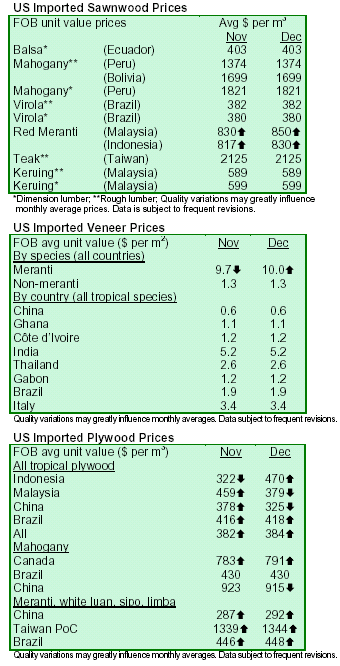|
US lawmakers seek ban on illegal timber imports
A group of Republican and Democrat congressmen want to crack down on illegal logging around the world. Led by
Democrat Rep. Earl Blumenauer, the group seeks support for a bill to ban US imports of wood products derived
from illegally harvested timber. Lawmakers hope to make US consumers more aware of where their new furniture orhardwood floor comes from, Mr.
Blumenauer said. He added that according to the US International Trade Commission, as much as 30% of US hardwood imports
were from suspicious or illegal sources, Much of the wood
is sent to China, where it is processed at low cost and then exported to the USA and other countries. Mr. Blumenauer
said that illegal logging costs US companies as much as $1 billion a year in lost exports and reduced prices for timber
products, according to the American Forest and Paper Association.
The logging bill would extend the Lacey Act, which prohibits importation of wildlife taken in violation of
conservation laws, to apply to wood and timber products. The measure would ban the import, export or sale of
timber products made in violation of domestic or foreign law or international treaty.
ENGO and workers call for levies on Indonesian paper
The Sierra Club and United Steelworkers union asked the US Commerce Department (USCD) to levy import duties
on paper from Indonesia, saying that wood used to make the paper is illegally logged. The environmental group and
the union, in the first joint case of its kind, argued that lax
enforcement of environmental laws amounts to a subsidy for the Indonesian paper companies and should be counteracted with US tariffs. According to them,
enormous growth in Indonesia¡¯s pulp and paper industries, fueled in large part by government subsidies, has raised
demand for timber and thus increased pressures to log illegally.
In the filing to the USCD, the groups cited a 2005 Department of Agriculture report that said more than half
the timber cut in Indonesia was harvested illegally. Systematic non-enforcement of Indonesian laws regarding
timber harvesting in state-owned forests permitted logging companies to obtain valuable government-owned
resources without paying adequate remuneration, the complaint contended. The groups did not detail how high
the tariffs should be to compensate for the allegedly illegal subsidies.
The steelworkers union represents workers at paper companies, including Ohio-based NewPage Corp. The
company brought an initial trade complaint last year against $600 million a year in glossy paper imports from
China, South Korea and Indonesia. The USCD is scheduled to make its initial ruling in that complaint by
April 2.

¡¡
|